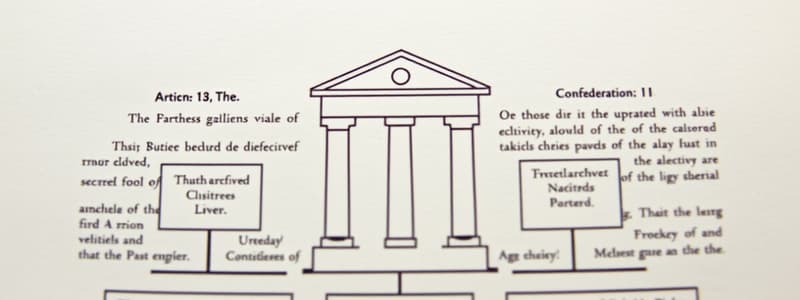Podcast
Questions and Answers
Match the following documents with their characteristics:
Match the following documents with their characteristics:
U.S. Constitution = Strengthened the power of the Federal Government Articles of Confederation = Provided limited federal power Bill of Rights = First ten amendments to the Constitution Declaration of Independence = Stresses individual liberty
Match the following groups with their beliefs:
Match the following groups with their beliefs:
Federalists = Supported ratification of the U.S. Constitution Anti-Federalists = Opposed a strong national government Federalist Papers = Encouraged ratification of the Constitution Bill of Rights = Protected individual civil liberties
Match the following amendments with their main protections:
Match the following amendments with their main protections:
1st Amendment = Freedom of Speech 4th Amendment = Protection against unreasonable searches 14th Amendment = Extends Bill of Rights to state actions 2nd Amendment = Right to bear arms
Match the following terms with their definitions:
Match the following terms with their definitions:
Match the following historical events with their significance:
Match the following historical events with their significance:
Match the following concepts with their descriptions:
Match the following concepts with their descriptions:
Match the following protections of individual rights with their amendments:
Match the following protections of individual rights with their amendments:
Match the following ideas with the founding documents they are associated with:
Match the following ideas with the founding documents they are associated with:
Study Notes
Differences Between U.S. Constitution and Articles of Confederation
- The U.S. Constitution strengthened the federal government's power, unlike the Articles of Confederation which provided limited national authority.
- It granted Congress exclusive control over interstate and foreign commerce, enhancing economic regulation.
- The Constitution established three separate branches of government: executive, legislative, and judicial, promoting checks and balances.
- It empowered the federal government to collect taxes, a critical tool for generating revenue and ensuring government functionality.
Similarities Between U.S. Constitution and Articles of Confederation
- Both documents included a national legislature responsible for lawmaking.
- They provided frameworks for cooperation between states, fostering a sense of unity.
Federalists vs. Anti-Federalists
- Federalists supported the Constitution's ratification, advocating for a strong national government to maintain order.
- They published the Federalist Papers to persuade others of the Constitution's necessity.
- Anti-Federalists opposed ratification, fearing it undermined individual rights and concentrated too much power in the national government.
- Their agreement to ratify only came after the promise to add the Bill of Rights, protecting individual liberties.
Bill of Rights
- The Bill of Rights comprises the first ten amendments to the Constitution, safeguarding civil liberties and preventing government overreach.
- It parallels the Declaration of Independence in emphasizing individual liberty and rights.
Key Protections and Amendments
- The Fourth Amendment guards against unreasonable search and seizure, a response to British abuses during colonial times.
- The Fourteenth Amendment extends the Bill of Rights protections to state actions, ensuring states also uphold citizens' rights.
- Major rights protected include the freedom to assemble, freedom of speech, and protections against unwarranted searches.
Church-State Separation and Freedom of Speech
- The First Amendment establishes the separation of church and state, preventing government interference in religious practices.
- Freedom of speech is a cornerstone of democratic rights, exemplified by the case of John Peter Zenger, who was acquitted for publishing factual critiques of government officials, thereby strengthening freedom of the press.
Studying That Suits You
Use AI to generate personalized quizzes and flashcards to suit your learning preferences.
Description
This quiz explores the key differences and similarities between the U.S. Constitution and the Articles of Confederation. It highlights how the Constitution strengthened federal power, established Congress's role in commerce, and created separate branches of government. Test your knowledge on these foundational documents of American government.




